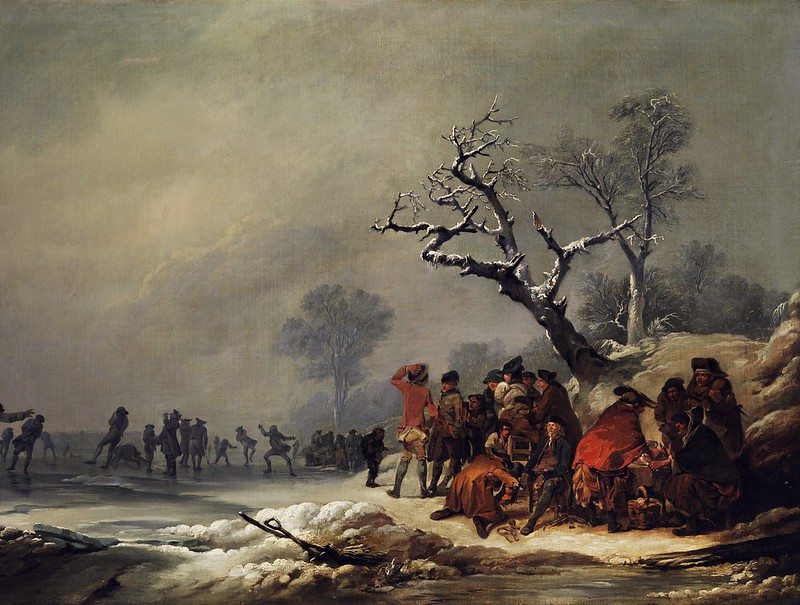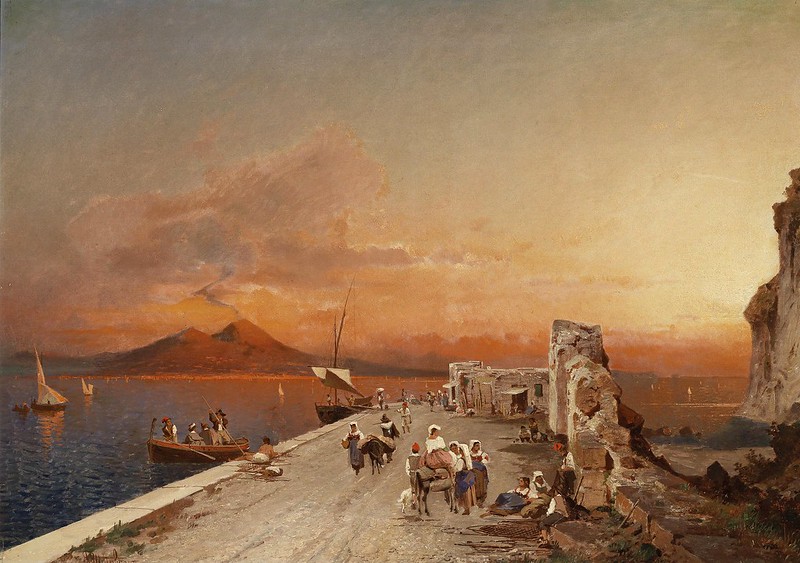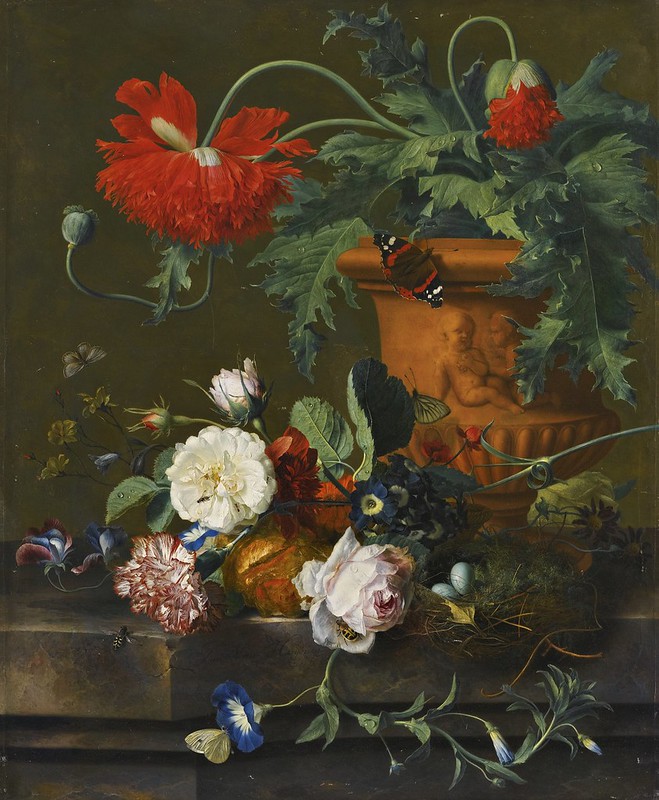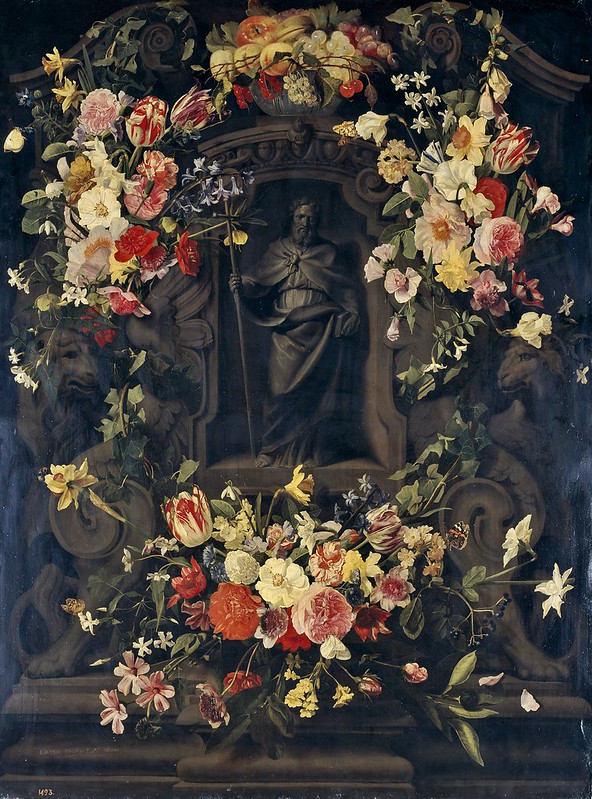Obra de Philip James de Loutherbourg (1740-1812), pintor anglès (1)
- Recordatori de John Marsh -
En el dia de la commemoració del seu 187è aniversari de decés
Parlem de Pintura...
Philip James de Loutherbourg (Strasbourg, 31 d'octubre de 1740 - Chiswick, 11 de març de 1812) va ser un pintor anglès d'origen francès. El seu pare, expert en pintura de miniatures, el va iniciar en l'art de la pintura. Després de formar-se a la Universitat d'Estrasburg va estudiar a París amb Charles-André van Loo especialitzant-se ràpidament en pintura de paisatges i vistes marines. El 1767 va entrar a formar part de l'Acadèmia Francesa i va exposar algunes de les primeres obres. Més tard va viatjar per l'Europa Central i Itàlia en busca de nous recursos i tècniques pictòriques. El 1771 va viatjar a Londres adquirint la nacionalitat anglesa pocs anys després. Allà va entrar com a membre de la Royal Academy. Va morir a Chiswick el març de 1812.
Font: En català: No disponible - En castellano: Philip James de Loutherbourg (1740-1812) - In english: Philip James de Loutherbourg (1740-1812) - Altres: Philip James de Loutherbourg (1740-1812)
Parlem de Música...
John Marsh (Dorking, 31 de maig de 1752 - Chichester, 31 d'octubre de 1828) va ser un escriptor i compositor anglès. Si bé va mostrar un prematur interès musical, el seu pare, un capità de la Marina Reial, el va intentar persuadir per tal que seguís els seus passos militars. El 1768 va convèncer el seu pare per accedir a una formació en Dret i de forma paral·lela en música amb l'organista Wafer de la Gosport Chapel. Aquesta va ser la seva única formació acadèmica ja que ràpidament va començar a compondre i a participar en els concerts de Portsmouth i Gosport. Poc després va viatjar a Romsey on es va dedicar a l'ensenyament de viola, violoncel, oboè i orgue. Aquests van ser els primers anys de composició més sistemàtics publicant els seus primers concerts. El 1776 es va traslladar a Salisbury on va reactivar la vida musical de la ciutat i on va, a banda de compondre, va interpretar el violí i l'orgue amb constància. Va ser allà on va publicar algunes de les seves famoses simfonies que també va interpretar en el Salisbury Festival. El 1783 va heretar una finca a Kent i es va traslladar a viure en aquesta ciutat. Allà va assolir un càrrec de director musical de Canterbury, una ciutat amb poca tradició artística fins aleshores. El 1787 es va traslladar amb la seva família a Chichester, ciutat on hi va viure la resta de la seva vida. Novament es va trobar una ciutat musicalment pobra que va fer reviure amb l'energia del seu esforç. El 1813 va decidir jubilar-se i es va dedicar a viatjar i a viure en família. El seu fill Edward Garrard Marsh va ser poeta. Marsh va morir a Chichester l'octubre de 1828.
OBRA:
all published in London
Vocal secular:
Lucy's Call from Colin's Tomb (song), 1v, orch (1786)
2 Serious & 2 Cheerful Glees, op.10 (1787)
The City Feast, or Man of True Taste (glee), vv, insts (1789)
The Dying Christian to his Soul (The Christian's Glorious Triumph)(ode, Pope), 1v, pf (1797)
Happy are we met, 5vv, op.30 (1801)
Cowper's Stanzas to Mary (song) (1804)
Lost:
at least 18 glees, 19 songs, other works
Vocal religiosa:
A Verse Anthem in 4 parts, from the 150th Psalm … to which are added 10 new psalm tunes … also 5 chants and 3 hymns (1785)
14 New Psalm Tunes in 4 parts and Different Stiles (1790), also incl. 2 hymns and some chants
6 Anthems in 4 parts with a verse Sanctus & Kyrie, op.18 (1797)
24 New Chants in 4 Parts, op.42 (1804)
Te Deum and Jubilate, D, org acc. (c1880)
ed.: The Cathedral Chant Book, 3 vols (1808) [c200 chants]
Lost:
Collection of Psalms, Hymns & Anthems for the Use of Country Choirs (1811);
10 Original Sacred Melodies with New Zealander's Welcome to English Missionaries (1823);
7 anthems, chants, 11 hymns, ps settings, service settings, TeD, other works
Instrumental:
Orch.:
A Conversation Sinfonie for 2 Orchestras, 2 vn, 2 va, 3 b, 2 ob, 2 hn, timp (1784)
A Favorite Symphony, no.1, B (1784)
A Favorite Symphony, no.2, B (1784)
A Favorite Symphony, no.3, D (1784)
A Quartetto composed in imitation of the stile of Haydn's Opera Prima, 2 vn, va, vc (1785)
A Favorite Symphony, no.4, F (1789)
An Overture and 8 Sonatinas, pf, vn, vc (1794)
A Favorite Symphony, no.5, E (1797)
A Favorite Symphony, no.6, D (1797)
A Favorite Symphony, ‘La Chasse’, no.7, E (1800)
A Favorite Symphony, no.8, G (1800)
Three Finales or Short Concluding Pieces for Concerts (1801)
3 Overtures (in 5 parts) for small concerts or private musical parties, op.37 (1803)
3 Overtures in several parts … composed after the manner of the Ancient Masters (1825)
Arrs.:
Haydn: Symphony no.74, vn, pf (1789)
Lost (many are arrs. of other works by Marsh):
Concertante, D (1781);
30 syms.;
15 orch concs.;
Conc., 2 hn;
Org Conc.;
Vn Conc.;
Air with Variations, org, orch;
2 rondeaux, vn, orch;
military music and marches;
Chbr.:
Keyboard:
Fugue, org duet (1783) [pubd with 2 arrs. of works by Handel]
18 Voluntaries, org (1791)
20 Voluntaries, org, second sett (1792)
An Overture and 6 Pieces, org (1799)
A Third Set of Voluntaries … to which are prefixed 23 preludes or short introductions for verse anthems, org (1806)
Works by Corelli, Handel, Geminiani, Haydn, Mozart and others arr. as voluntaries, org, 6 vols (1806–14); arr. of T. Carter: Ov. to The Rival Candidates, pf/hpd 4 hands (1783)
A Fourth Set of Voluntaries, org (1815)
A Fifth Set of Voluntaries, org (1822)
Lost:
3 Marches, pf (1791), arr. of military music;
Chichester Volunteers, pf (1802), arr. of sym. no.26;
Voluntaries, org (1806);
over 160 other org voluntaries;
Tpt Piece, org duet;
Sonata, C, pf;
Sonatina, G, pf;
arrs. of ovs. by Giardini and T. Arne, hpd duet (1782)
4 Fugues;
Witches Dance for Locke's Macbeth;
2 double trios, fl, vn, 2 va, 2 b;
Qnt, fl, 2 vn, va, vc;
Qnt, 2 vn, 2 va, vc;
9 str qts;
2 divertimentos;
6 str trios;
3 vn duets;
Vn Solo;
arr. of Dettingen TeD, sextet (1812)
Literatura:
Other writings cited in Sainsbury, lost
‘A Comparison between the Ancient and Modern Styles of Music’, Monthly Magazine, ii (1796–7), 981–5; repr. in Cudworth (1955)
Hints to Young Composers of Instrumental Music (London, 1805); repr. in GSJ, xviii (1965), 57–71
The Rudiments of Thorough Bass, op.47 (London, 1805)
A Short Introduction to the Theory of Harmonics, or The Philosophy of Musical Sounds (Chichester, 1809)
Instructions and Progressive Lessons in all the Principal Keys of the Tenor (London, c1880); excerpt in GSJ, xix (1966), 133–4
Journals (MS, 1796–1828, US-SM), initially based on diaries from 1765, ed. B. Robins (Stuyvesant, NY, 1998) [incl. detailed list of works and writings];
abridged version by Marsh's son, E.G. Marsh (MS, GB-Cu);
adapted as Recollections (MS, GB-Lco, Sowerbutts Collection)
4 articles in Monthly Magazine (1806–7), 2 signed ‘xyz’;
1 article in New Monthly Magazine (1815);
7 articles signed ‘Senex’ in Quarterly Musical Review (1821–6)
Lost:
Treatises on the ‘Basso Viola’, Harmonics, Change Ringing, Thorough Bass, the Organ;
other reflections on music;
other biographical accounts
OBRA:
all published in London
Vocal secular:
Lucy's Call from Colin's Tomb (song), 1v, orch (1786)
2 Serious & 2 Cheerful Glees, op.10 (1787)
The City Feast, or Man of True Taste (glee), vv, insts (1789)
The Dying Christian to his Soul (The Christian's Glorious Triumph)(ode, Pope), 1v, pf (1797)
Happy are we met, 5vv, op.30 (1801)
Cowper's Stanzas to Mary (song) (1804)
Lost:
at least 18 glees, 19 songs, other works
Vocal religiosa:
A Verse Anthem in 4 parts, from the 150th Psalm … to which are added 10 new psalm tunes … also 5 chants and 3 hymns (1785)
14 New Psalm Tunes in 4 parts and Different Stiles (1790), also incl. 2 hymns and some chants
6 Anthems in 4 parts with a verse Sanctus & Kyrie, op.18 (1797)
24 New Chants in 4 Parts, op.42 (1804)
Te Deum and Jubilate, D, org acc. (c1880)
ed.: The Cathedral Chant Book, 3 vols (1808) [c200 chants]
Lost:
Collection of Psalms, Hymns & Anthems for the Use of Country Choirs (1811);
10 Original Sacred Melodies with New Zealander's Welcome to English Missionaries (1823);
7 anthems, chants, 11 hymns, ps settings, service settings, TeD, other works
Instrumental:
Orch.:
A Conversation Sinfonie for 2 Orchestras, 2 vn, 2 va, 3 b, 2 ob, 2 hn, timp (1784)
A Favorite Symphony, no.1, B (1784)
A Favorite Symphony, no.2, B (1784)
A Favorite Symphony, no.3, D (1784)
A Quartetto composed in imitation of the stile of Haydn's Opera Prima, 2 vn, va, vc (1785)
A Favorite Symphony, no.4, F (1789)
An Overture and 8 Sonatinas, pf, vn, vc (1794)
A Favorite Symphony, no.5, E (1797)
A Favorite Symphony, no.6, D (1797)
A Favorite Symphony, ‘La Chasse’, no.7, E (1800)
A Favorite Symphony, no.8, G (1800)
Three Finales or Short Concluding Pieces for Concerts (1801)
3 Overtures (in 5 parts) for small concerts or private musical parties, op.37 (1803)
3 Overtures in several parts … composed after the manner of the Ancient Masters (1825)
Arrs.:
Haydn: Symphony no.74, vn, pf (1789)
Lost (many are arrs. of other works by Marsh):
Concertante, D (1781);
30 syms.;
15 orch concs.;
Conc., 2 hn;
Org Conc.;
Vn Conc.;
Air with Variations, org, orch;
2 rondeaux, vn, orch;
military music and marches;
Chbr.:
Keyboard:
Fugue, org duet (1783) [pubd with 2 arrs. of works by Handel]
18 Voluntaries, org (1791)
20 Voluntaries, org, second sett (1792)
An Overture and 6 Pieces, org (1799)
A Third Set of Voluntaries … to which are prefixed 23 preludes or short introductions for verse anthems, org (1806)
Works by Corelli, Handel, Geminiani, Haydn, Mozart and others arr. as voluntaries, org, 6 vols (1806–14); arr. of T. Carter: Ov. to The Rival Candidates, pf/hpd 4 hands (1783)
A Fourth Set of Voluntaries, org (1815)
A Fifth Set of Voluntaries, org (1822)
Lost:
3 Marches, pf (1791), arr. of military music;
Chichester Volunteers, pf (1802), arr. of sym. no.26;
Voluntaries, org (1806);
over 160 other org voluntaries;
Tpt Piece, org duet;
Sonata, C, pf;
Sonatina, G, pf;
arrs. of ovs. by Giardini and T. Arne, hpd duet (1782)
4 Fugues;
Witches Dance for Locke's Macbeth;
2 double trios, fl, vn, 2 va, 2 b;
Qnt, fl, 2 vn, va, vc;
Qnt, 2 vn, 2 va, vc;
9 str qts;
2 divertimentos;
6 str trios;
3 vn duets;
Vn Solo;
arr. of Dettingen TeD, sextet (1812)
Literatura:
Other writings cited in Sainsbury, lost
‘A Comparison between the Ancient and Modern Styles of Music’, Monthly Magazine, ii (1796–7), 981–5; repr. in Cudworth (1955)
Hints to Young Composers of Instrumental Music (London, 1805); repr. in GSJ, xviii (1965), 57–71
The Rudiments of Thorough Bass, op.47 (London, 1805)
A Short Introduction to the Theory of Harmonics, or The Philosophy of Musical Sounds (Chichester, 1809)
Instructions and Progressive Lessons in all the Principal Keys of the Tenor (London, c1880); excerpt in GSJ, xix (1966), 133–4
Journals (MS, 1796–1828, US-SM), initially based on diaries from 1765, ed. B. Robins (Stuyvesant, NY, 1998) [incl. detailed list of works and writings];
abridged version by Marsh's son, E.G. Marsh (MS, GB-Cu);
adapted as Recollections (MS, GB-Lco, Sowerbutts Collection)
4 articles in Monthly Magazine (1806–7), 2 signed ‘xyz’;
1 article in New Monthly Magazine (1815);
7 articles signed ‘Senex’ in Quarterly Musical Review (1821–6)
Lost:
Treatises on the ‘Basso Viola’, Harmonics, Change Ringing, Thorough Bass, the Organ;
other reflections on music;
other biographical accounts
Parlem en veu pròpia o en veu d'altri...
Music Web (source/font: aquí)
---
Although Marsh took a lively and active interest in music throughout his long life, it was, as he pointed out in the autobiographical sketch he provided for John Sainsbury, ‘not his only pursuit’. The journal that he kept for most of his life reveals a man of extraordinarily diversified interests, ranging from astronomy (on which he wrote two published books) and campanology to a part-time military career as an officer in the sometimes unruly Chichester Volunteers during the Napoleonic Wars. In addition to Marsh's extensive writings on music, his published articles address such topics as religious philosophy and geometry. His writings on musical topics cover a wide range of subjects, and reveal an unusually balanced and sensible approach to arguments such as the relative merits of ‘ancient’ and ‘modern’ compositions. Marsh was also occupied with the prevailing low standards of cathedral music: in the preface to his Cathedral Chant Book (1808) he laid the foundations for the reform of Anglican psalm chanting. The most important of Marsh's extant compositions, the Eight Favorite Symphonies published between 1784 and 1800, reveal a composer well-versed in the requirements of the mixed professional and amateur provincial orchestras he encountered. Concertante parts for more able players are judiciously juxtaposed with easier tutti writing, and in a work like the Conversation Sinfonie, for two orchestras, composed in 1778, Marsh also shows a keen awareness of orchestral colour, disposing his two groups so as to pit high instruments against low. He was one of the first musicians in England to appreciate Haydn's stature, and his finest surviving symphony, A Favorite Symphony, no.6 in D major (1796), pays particular homage in a four-movement work scored for full Classical orchestra including trumpets and timpani. In general terms the symphonies are characterised by an open, direct freshness and strong melodic appeal, qualities also in evidence in the five-movement string quartet of 1785. The anthems are confident and effective examples of the later Georgian verse anthem. Marsh's special concern for affective word setting is articulated in his criticism of certain aspects of William Boyce's setting of By the waters of Babylon (Ps cxxxvii) in the preface to his Six Anthems, op.18
GROVE MUSIC ONLINE (source/font: aquí)
Gaudiu i compartiu!
Informació addicional...
AMAZON: Marsh - Five Symphonies
IMSLP: John Marsh (1752-1828)
CPDL: No disponible
SPOTIFY: Marsh - Five Symphonies







